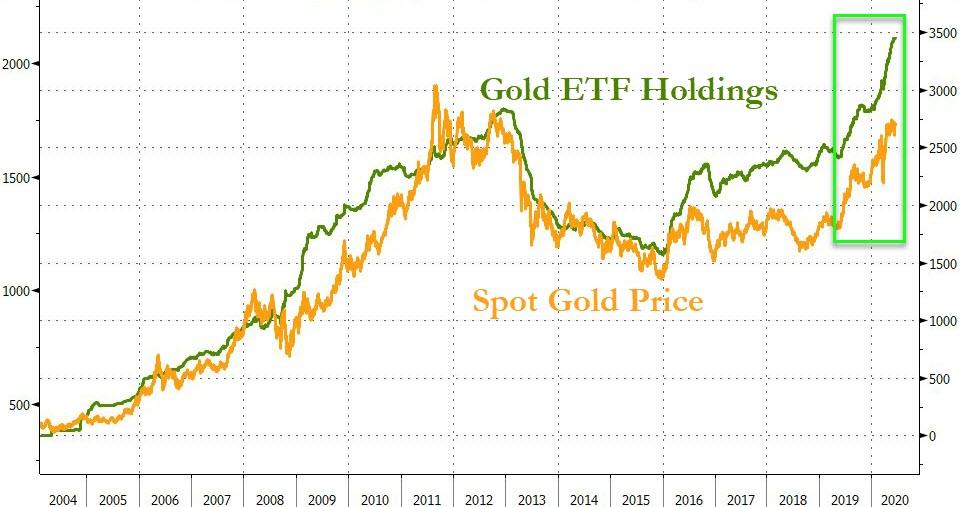Gold ETF Inflows Break Yearly Record In Just Five Months
Tyler Durden
Tue, 06/16/2020 – 13:41
Holdings in gold-backed ETFs charted another all-time high in May as inflows in dollar-terms have already set a yearly record just five months into 2020.
Globally, funds added another 154 tons of gold to their holdings boosting the total to a record 3,510 tons, according to the latest data released by the World Gold Council.
Over the past 12 months, assets in global gold-backed ETFs have nearly doubled.
In dollar-terms, year-to-date inflows of $33.7 billion have already exceeded the previous high seen back in 2016.
Another month of positive inflows in May, coupled with the rising price of gold, also pushed assets under management (AUM) in gold ETFs to a new record high of $195 billion.
North American firms led regional inflows for the second straight month and hit all-time highs in May. Funds based in North America increased holdings by 102 tons. North American funds now hold 1,815 tons of the yellow metal, surpassing the previous highs of 1,736 tons charted in December 2012.
European funds saw inflows of 45 tons. UK-based funds led the way, accounting for about 65% of the regional total for the month.
Asian funds – primarily those based in China – added to their holdings as well, with inflows of 4.8 tons.
Funds in other regions, including Australia, added 2.6 tons of gold to their holdings.
The World Gold Council listed four factors helping drive the flow of gold into ETFs.
-
The economic and social impact of COVID-19, as most economies remain shut down or are slowly reopening.
-
Tensions between the US and China continue to escalate.
-
Labour markets are facing challenges not seen in generations. In the US, the unemployment rate is already at 14% and may soon reach levels last during the Great Depression of the 1930s.
-
Monetary policy intervention is expanding into asset classes that would have seemed incredibly unlikely even a few months ago, such as high yield (junk) bond ETFs in the US. This has helped push bond yields even lower, reducing gold’s opportunity cost further and adding to market uncertainty as we are in unchartered waters.
Gold was up 2.6% in dollar terms in May. Price volatility was also lower.
At the time of publication, gold has outperformed most major asset classes this year, up by more than 15%. Gold’s performance continues to distinguish itself from the wider commodity spectrum, as broader commodity indices are down 22% – 30% this year and oil (WTI) is down by more than 40%.”
Inflows of gold into ETFs are significant in their effect on the world gold market, pushing overall demand higher.
ETFs are backed by physical gold held by the issuer and are traded on the market like stocks. They allow investors to play gold without having to buy full ounces of gold at spot price. Since their purchase is just a number in a computer, they can trade their investment into another stock or cash pretty much whenever they want, even multiple times on the same day. Many speculative investors appreciate this liquidity.
There are good reasons to invest in ETFs, but they aren’t a substitute for owning physical metal. In an overall investment strategy, SchiffGold recommends buying gold bullion first.
When considering gold-backed ETFs, you should always keep in mind that you don’t actually own the gold. Buying the most common ETFs does not entitle you to any actual amount of the precious metal.
* * *
There’s a difference between investing in gold-backed ETFs and physical gold. Learn more here.

